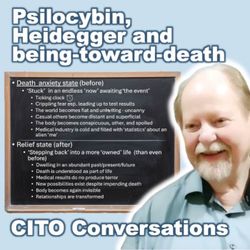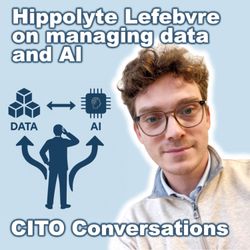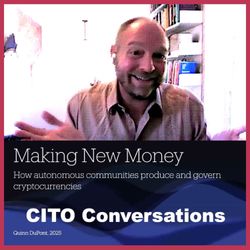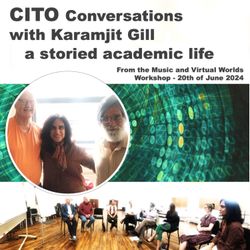CITO Conversations
All Episodes

12. Johno (Robert Johnston) on Psilocybin, Heidegger and being-toward-death
01:24:47||Season 1, Ep. 12Psilocybin, Heidegger and being-toward-deathBetween 2020 and 2023 psychologist Marg Ross and psychiatrist Justin Dwyer, together with collaborators, ran the largest Australian randomised control of psychedelic assisted psychotherapy for the treatment of extreme death anxiety in terminally ill patients using psilocybin (the active ingredient in magic mushrooms) (Ross et al, 2025). Over the past 15 months I have contributed to the analysis and reporting of qualitative interview data collected by these researchers before and after treatment. The therapy has been shown to be remarkably effective with 21 out of 28 patients who completed the full trial reporting sustained relief. Whereas before the treatment the patients had found themselves 'stuck' in an oppressive lingering present, after treatment they are able to 'step back into' a life that is in some ways fuller even than before the diagnosis (Dwyer et al, 2026). In this reading group/seminar I will briefly present Heidegger's account in Division II of Being and Time of being-toward-death and its role in prompting a more authentic human existence and richer lived temporality. I will point out its striking similarity to the change phenomenon we observed in the qualitative analysis. I invite discussion of this observation, its implications, and suggestions. Note I will devote little time to describing the clinical trial so reading the accompanying paper (Dwyer et al, 2026) is advised.JohnoRobert B. Johnston is a professor (emeritus) at University College Dublin, and a person in his own right.Dwyer, J., Johnston, R. B., O'Callaghan, C., and Ross, M. 2026. "Stepping Back into Life: How Psychedelic Assisted Psychotherapy Transforms the Way of Life of the Terminally Ill," General Hospital Psychiatry (98), pp. 86-96. doi: 10.1016/j.genhosppsych.2025.12.002AcknowledgementsMusic Title: Justice Little LeagueArtist: Ema GraceSource: https://bit.ly/2tJ6BndLicense: CC BY 4.0Artist notes: Ema Grace is an AI vocaloid produced by Ryoma MAEDA (@Ryoma_Maeda). Styled as virtual Singer&Idol 架空のバーチャルアイドル & シンガー、それがEma Grace.Cover Art Title: Inspired by zoomArtist: Allen HigginsSource: CITO-podcast-Johno.pptxLicense: CC BY-NC-SA 4.0Podcast LicenseDesign Talk (dot IE) CC BY-NC-SA 4.0 The license can be viewed at https://creativecommons.org/licenses/by-nc-sa/4.0By taking part you give permission for your voice to be recorded, for the recording to be edited, and for it to be posted and published as a podcast.
11. Data Practices with Hippolyte Lefebvre
28:43||Season 1, Ep. 11Welcome to the CITO Podcast.Séamas Kelly invites Hippolyte Lefebvre to present an overview of his research interests and direction. Hippolyte is a member of CITO and the Management Information Systems group in the UCD College of Business, Dublin, and previously at the Université de Lausanne, Switzerland.Notes, extra questions, and further reading:Homepage at UCD - https://people.ucd.ie/hippolyte.lefebvreHippolyte’s Google scholar page ishttps://scholar.google.com/citations?user=Uxo4pH4AAAAJ&hl=en&oi=aoAcknowledgementsMusic Title: Justice Little LeagueArtist: Ema GraceSource: https://bit.ly/2tJ6BndLicense: CC BY 4.0Artist notes: Ema Grace is an AI vocaloid produced by Ryoma MAEDA (@Ryoma_Maeda). Styled as virtual Singer&Idol 架空のバーチャルアイドル & シンガー、それがEma Grace.Cover Art Title: Inspired by selfie and AIArtist: Allen HigginsSource: CITO-podcast-DataPractices.pptxLicense: CC BY-NC-SA 4.0Podcast LicenseDesign Talk (dot IE) CC BY-NC-SA 4.0 The license can be viewed at https://creativecommons.org/licenses/by-nc-sa/4.0By taking part you give permission for your voice to be recorded, for the recording to be edited, and for it to be posted and published as a podcast.
10. Making New Money by Quinn DuPont
01:10:28||Season 1, Ep. 10Welcome to the CITO Podcast.This episode is a seminar by Quinn DuPont titled “Making New Money: How autonomous communities produce and govern cryptocurrencies.” Paul Dylan-Ennis will open the session with a brief introduction after which Quinn will present an overview of his project, after which Donncha Kavanagh will make some observations and invite reactions.Decentralized cryptocurrencies are upending the foundations of economic power, challenging centuries of state and bank control over money. This research critically examines the rise of digital wildcat banking and its profound implications for economic sovereignty. Leveraging digital forensics, data science, and OSINT, this work reveals who actually produces and governs cryptocurrencies—and how their collective labor reshapes value and risk. It explores the forces behind decentralized money, the vulnerabilities these systems introduce, and the future role of state-issued currencies in an era of rapid monetary transformation.Reflecting on the project Quinn notes:"I've been working on this for well over a year now, and while it is still in development, the basic outline is complete. I make some pretty provocative claims, like arguing that global forces first emerging in the 1970s lead us inexorably to this point where the labour required to produce and govern new money has become involuted[1]. It’s a unique project that reveals how new money is made and details the implications for banks, nation states, and society. I also have some fun stories to share, like my effort to vampire attack Trump's WLFI token or my reverse engineering of the FBI's Operation Token Mirrors."[1] Involution; the theory from Clifford Geertz where, in the original context, rice production becomes internally competitive and the processes require more labour without an increase in output - analogous to this story of technological development and precarious technological labour. I argue that the operational infrastructure of crypto expands to require more labour, despite no correlated increase in output. Thus, crypto overtakes national currencies not by meeting a market demand, but by accommodating excess labour supply.Notes, extra questions, and further reading:Quinn’s homepage - https://iqdupont.comChina’s “Involuted” Generation by Yi-Ling Lu | The New Yorker Published MAY 14The president and the billion-dollar crypto businesses – How the Trump companies made $1bn from crypto by Joe Miller and Alex Rogers in Washington, Paul Caruana Galizia, Nikou Asgari, Eade Hemingway, Oliver Hawkins and Chris Cook in London | FT.com Published OCT 16 2025"Overcapacity" or "involution"? How China's manufacturing suffers from over-competition Tracing the roots and perils by Elena Wang and Nina Chen | Baiguan.news Published APR 18 2024AcknowledgementsMusic Title: CrazyMixArtist: Sandbox Korg AbletonSource: CrazyMix.aifLicense: : CC BY-NC-SA 4.0Cover Art Title: Inspired by Wordpress DefaultsArtist: Allen HigginsSource: CITO-podcast-STS.pptxLicense: CC BY-NC-SA 4.0Podcast LicenseDesign Talk (dot IE) CC BY-NC-SA 4.0 The license can be viewed at https://creativecommons.org/licenses/by-nc-sa/4.0By taking part you give permission for your voice to be recorded, for the recording to be edited, and for it to be posted and published as a podcast.
9. STS Community Making with Cassidy R. Sugimoto and Rob Kitchin
01:08:21||Season 1, Ep. 9The STS Ireland unconference of 25 June 2024.Welcome by Kalpana ShankarProfessor Cassidy R. Sugimoto, chair of the School of Public Policy at Georgia Institute of Technology and Professor Rob Kitchin from the Social Sciences Institute at Maynooth University.(the unconference was held at the Museum of Literature Ireland (MoLI), St Stephen’s Green South, Dublin.)Why an unconference? An unconference is an event where the attendees help set the agenda and content. Rather than papers and panels, we want to use this opportunity to foster networking and discussion.The goal of this inaugural event was to acknowledge the specificities but also international connections/reach of STS (and the general implications of scientific research and policy here in Ireland) and bring researchers together for networking from different institutional and disciplinary homes. The unconference format included panel talks and small-group discussions to explore various facets of the socio-cultural study of technology, science, and medicine.Schedule:9:45 Registration10:30-10:40 Overview/welcome10:45-11:40 Keynotes11:50-12:40 Panel discussion - Cassidy, Rob, Kalpana (Moderator - Christo)12:50-1:50 Lunch1:50-2:45 Breakout 1 (1:50 - 2:30, then return and discuss)2:45-3:40 Breakout 2 (2:45 - 3:40)3:45-4:30 Debrief and next steps4:30-4:45 ClosingNotes, further reading:Organised by Kalpana (kalpana.shankar@ucd.ie); Christo (christo.jacob@ucdconnect.ie)The Website and registration link: https://stscommunityireland.wordpress.com/Supported by the European Association for the Study of Science and Technology (EASST) Network Fund and the University College Dublin Centre for Digital Policy.Museum of Literature Ireland - https://moli.ieAcknowledgementsMusic Title: CrazyMixArtist: Sandbox Korg AbletonSource: CrazyMix.aifLicense: : CC BY-NC-SA 4.0Cover Art Title: Inspired by Wordpress DefaultsArtist: Allen HigginsSource: CITO-podcast-STS.pptxLicense: CC BY-NC-SA 4.0Podcast LicenseDesign Talk (dot IE) CC BY-NC-SA 4.0 The license can be viewed at https://creativecommons.org/licenses/by-nc-sa/4.0By taking part you give permission for your voice to be recorded, for the recording to be edited, and for it to be posted and published as a podcast.
8. A Storied Academic Life - Karamjit Gill
57:46||Season 1, Ep. 8The following is the second recording from the Music and Virtual Worlds Workshop held on the 20th of June, 2024 – where invited guest, Emeritus Professor Karamjit Gill, co-founder and editor of the journal AI & Society reflected on his personal academic habitus; How he felt called to take action and respond to the question: How do you bring people together to help others, to make change and create social value through technology, without money, without power, without fame, and when the human-technological-systems to do this are yet to be invented?As a side note: This segment of the workshop was originally intended as a dialog between Professors Karamjit Gill and Liam Bannon, talking about the role of technology in shaping human society and implications for computer mediated immersive experiences. Unfortunately, due to illness Liam was unable to attend on the day, but we did visit him later in the afternoon at University Hospital Limerick. As it happened, Liam was in great form and while he wasn’t able to check-out from the hospital on the day, he was able to finally meet Karamjit and Satinder on a warm summer’s evening. In fact it was their first face-to-face meeting even though they had known one another for many years and been involved in writing and reviewing for the journal from afar. So this is something by way of explanation for this episode’s cover art; a photo of Liam, Satinder, and Karamjit at UHL. And the lower picture is a snapshot from the panel discussion in the Irish Chamber Orchestra Building, University of Limerick.Credit: Allen Higgins, 20th June 2024.Notes, mentions, and further reading:Mike Cooley (Wikipedia link) – Author of Architect or Bee? (1980). The Journal AI & Society: Knowledge, Culture and Communication (link). Published by Springer. Established in 1987. Co-founded by Professors Michael Cooley and Karamjit Gill. Founding advisory board members: Joseph Weizenbaum, Hubert Dreyfus, Daniel Dennett, Maggie Boden, Terry Winograd, David F. Noble, Seymour Papert, Marvin Minsky and others (see article at link).XTREME – “Mixed Reality Environment for Immersive Experience of Art and Culture” (link) The INSYTE-Cooley Research Lab (I-CRL link) AcknowledgementsMusicTitle: Adagio in G minorArtist: Remo Giazotto attributed to Tomaso AlbinoniSource: https://soundcloud.com/dick-de-ridder/adagio-in-g-minor-albinoniLicensed by Dick de Ridder: CC-BY 3.0Cover Art Title: Vignettes from LimerickArtist: Allen Higgins Source: LiamKaramjitSatinder_Cover_Art.pptxLicense: CC BY-NC-SA 4.0Podcast LicenseDesign Talk (dot IE) CC BY-NC-SA 4.0 The license can be viewed at https://creativecommons.org/licenses/by-nc-sa/4.0By taking part you give permission for your voice to be recorded, for the recording to be edited, and for it to be posted and published as a podcast.
7. The Music and Virtual Worlds Workshop
01:07:31||Season 1, Ep. 7The following is a recording from the Music and Virtual Worlds Workshop held on the 20th of June, 2024 - a working event of the XTREME project, a research projected funded by the European Union.The workshop was a preliminary activity of the XTREME project; which stands for“’miXed Reality Environment for IMmersive Experience’ of Art and Culture”.The goal of the project being to research new applications at the intersection between augmention technology and human kinaesthetic being. For example, by experimenting with embodied musical-artistic performance uniting AR/VR and AI, for therapeutic and other forms of human involvement.The panel included:Martin Cunneen, from the Kemmy Business School, University of Limerick and local PI for XTREME.Amanda Clifford, Physiotherapist, from the School of Allied Health, University of LimerickSatinder Gill, from the University of Cambridge’s Centre for Music and ScienceEmeritus Professor Karamjit Gill from University of Brighton and Editor of the journal AI & SocietyCathriona Murphy,Gerry Keenan, And Simon Thompson from the Irish Chamber Orchestra and the Irish World Academy of Music and Dance.And Andrew Kaung a researcher on the XTREME project.The goal for the workshop was to explain the scope of XTREME and its inspiration in ideas surrounding the blend of music, dance, physical and virtual embodiment. The local partners gathered to meet and introduce themselves, their motivations and research interests. Professors Karamjit Gill and Liam Bannon had planned to prompt a dialogue centred on the role of technology shaping human society and implications for computer mediated immersive experiences. Unfortunately, due to illness Liam was unable to attend on the day and so Karamjit offered a personal reflection on his own academic habilitation and storied career, which we present in the second episode/recording of this event.Notes, extra questions, and further reading:XTREME – “Mixed Reality Environment for Immersive Experience of Art and Culture” is an EU Horizon 2020 project that started in January 2024 and will finish in December 2026. XTREME will explore and provide a mixed reality (MR) solution to experience different forms of art. The project is in close collaboration with 14 different partners who together will explore different alternatives to the traditional way of accessing music and art experiences. https://xtremeitu.dk/about-xtreme Speakers: Martin Cunneen, Amanda Clifford, Satinder Gill, Karamjit Gill, Cathriona Murphy,Gerry Keenan, Simon Thompson and Andrew KaungAcknowledgementsMusicTitle: Adagio in G minorArtist: Remo Giazotto attributed to Tomaso AlbinoniSource: https://soundcloud.com/dick-de-ridder/adagio-in-g-minor-albinoniLicensed by Dick de Ridder: CC-BY 3.0Cover Art Title: Complex collage incorporating the XTREME logo imageArtist: Allen Higgins and XTREME projectSource: XTREME_Cover_Art.pptxLicense: CC BY-NC-SA 4.0Podcast LicenseDesign Talk (dot IE) CC BY-NC-SA 4.0 The license can be viewed at https://creativecommons.org/licenses/by-nc-sa/4.0By taking part you give permission for your voice to be recorded, for the recording to be edited, and for it to be posted and published as a podcast.
6. Policy and European Economic Convergence
50:20||Season 1, Ep. 6In this seminar, Professors Frank Barry and Marcin Piątkowski contrast Ireland and Poland’s pathways to economic independence and growth, through the lens of industrial and economic policy. This, against the turbulence of world events straddling the 20th and 21st centuries. We look at the growth of these two European nations ex-post being constituent states of colonial empires.The seminar was chaired by Dorota Piaskowska, associate professor in strategy and international business at University College Dublin, Ireland.Frank Barry is Professor of International Business & Economic Development at Trinity Business School and a member of the Royal Irish Academy.And Marcin Piątkowski is Professor of Economics at Kozminski University, Warsaw, and Lead Economist at the World Bank.This talk was recorded in person with a live audience on April 8th, 2024, in the UCD Michael Smurfit Graduate Business School, Dublin, Ireland.The seminar was supported by the Embassy of the Republic of Poland in Dublin and the UCD College of Business.Location - Lecture Theatre N204 (followed by a reception in the Laurence Crowley Boardroom)UCD Michael Smurfit Graduate Business SchoolCarysfort Avenue, Blackrock, County Dublin Thank you for listening, please follow and share if you liked this episode.The musical elements used are from the ‘Adagio in G Minor’ released under a CC-BY 3.0 license.See the show-notes or the description for details.AcknowledgementsMusic Title: Adagio in G minorArtist: Remo Giazotto attributed to Tomaso AlbinoniSource: https://soundcloud.com/dick-de-ridder/adagio-in-g-minor-albinoniLicensed by Dick de Ridder: CC-BY 3.0Cover Art Title: GraphicsAndTextArtist: Allen HigginsSource: Collage/various (CITO-podcast-FrankMarcin.pptx)License: CC BY-NC-SA 4.0Podcast LicenseDesign Talk (dot IE) CC BY-NC-SA 4.0 The license can be viewed at https://creativecommons.org/licenses/by-nc-sa/4.0By taking part you give permission for your voice to be recorded, for the recording to be edited, and for it to be posted and published as a podcast.
5. Phenomenology & Technology Part 2 - Lucas Introna
01:12:42||Season 1, Ep. 5This ‘from the archives’ recording is the first part of the keynote from “ Triangular Conference 2008”.We were delighted to have Dermot Moran and Lucas Introna to talk about the value of conducting research in the phenomenological tradition and considerations when carrying out research into organisations, information systems and modern technology. Part 2In part two Lucas argues that Phenomenology offers deep insights into fundamental aspects of the human experience of technology and information systems, with implications for the sociology of Management and Organisation.The talk was recorded in-person with a live audience on Thursday June the 5th 2008 in the UCD Lochlann Quinn Undergraduate School of Business, Belfield, Dublin, Ireland.The conference was supported by the UCD School of Business Doctoral Studies Programme and hosted by the UCD Centre for Innovation, Technology & Organisation (CITO).Acknowledgements Music Title: Adagio in G minorArtist: Remo Giazotto attributed to Tomaso AlbinoniSource: https://soundcloud.com/dick-de-ridder/adagio-in-g-minor-albinoniLicensed by Dick de Ridder: CC-BY 3.0 Cover Art Title: Discussion at the conference dinnerArtist: Allen HigginsSource: Collage/various (podcast-MoranIntrona_01.pptx)License: CC BY-NC-SA 4.0 Podcast LicenseDesign Talk (dot IE) CC BY-NC-SA 4.0 The license can be viewed at https://creativecommons.org/licenses/by-nc-sa/4.0By taking part you give permission for your voice to be recorded, for the recording to be edited, and for it to be posted and published as a podcast.
4. Phenomenology & Technology Part 1 - Dermot Moran
01:11:14||Season 1, Ep. 4This ‘from the archives’ recording is the first part of the keynote from “ Triangular Conference 2008”.We were delighted to have Dermot Moran and Lucas Introna to talk about the value of conducting research in the phenomenological tradition and considerations when carrying out research into organisations, information systems and modern technology. Part 1In part one Dermot introduces Phenomenology and argues for its continuing relevance to Philosophy and Science. The talk was recorded in-person with a live audience on Thursday June the 5th 2008 in the UCD Lochlann Quinn Undergraduate School of Business, Belfield, Dublin, Ireland.The conference was supported by the UCD School of Business Doctoral Studies Programme and hosted by the UCD Centre for Innovation, Technology & Organisation (CITO).Acknowledgements Music Title: Adagio in G minorArtist: Remo Giazotto attributed to Tomaso AlbinoniSource: https://soundcloud.com/dick-de-ridder/adagio-in-g-minor-albinoniLicensed by Dick de Ridder: CC-BY 3.0 Cover Art Title: Discussion at the conference dinnerArtist: Allen HigginsSource: Collage/various (podcast-MoranIntrona_01.pptx)License: CC BY-NC-SA 4.0 Podcast LicenseDesign Talk (dot IE) CC BY-NC-SA 4.0 The license can be viewed at https://creativecommons.org/licenses/by-nc-sa/4.0By taking part you give permission for your voice to be recorded, for the recording to be edited, and for it to be posted and published as a podcast.
loading...